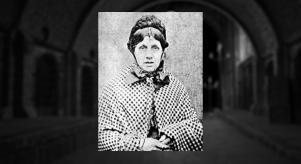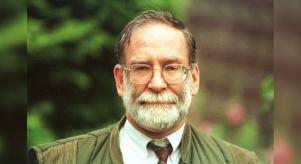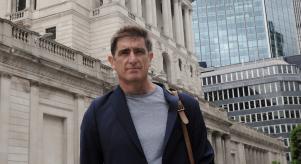
Interview with Nick Yarris who Wrongly Spent 22 Years on Death Row
I Am a Killer is a crime series like no other that puts death row inmates centre stage to tell their own story about the events that have led to their incarceration and death sentence.
Over ten episodes we have met innocent bystanders, cold-blooded killers and those who have killed while experiencing extreme psychotic episodes. No story is the same and every one leaves you with more questions.
Nick Yarris knows exactly what it's like for those ten men featured in the show. He spent 22 years on death row, wrongly convicted of a crime he did not commit. It is a story he has told countless times and recounted in the Netflix documentary,The Fear of 13 but when he begins to talk his voice still cracks with emotion.
'My Nick is Yarris and I come from Philidelphia Pennsylvania. My story begins in 1968 when I was a seven-year-old child and I went through the trauma of being sexually molested. The development of my life from then until my teenage years was a chaotic mix of thievery violence and drug use. I was initially arrested at the age of 20 and while incarcerated on made up charges against me of attempted murder upon a police officer who said he had pulled me over for a traffic violation I made up a lie that sent me to death row for 22 years by claiming I had information about the rape and murder of Linda Mae Craig in December of 1981. That lie would cost me everything'.In 1982, aged 21, Nick was sentenced to death and would spend the next 22 years locked up.
How does someone cope with being sentenced to death when they are innocent? Nick's answer is remarkable.
'I really wasn't innocent. I was a criminal, I was a drug addict, a thief and a liar and I did a lot of horrible things as a young person...I was wrongly convicted of something I didn't do and I made it that distinction so I wouldn't carry the victimisation of being completely innocent. They didn't pick me up on the way to church reading a bible. Let's be realistic, I wasn't an innocent person, I was innocent of the charges.'
Whether he considered himself completely innocent or not he still had to endure two decades being on death row. What were his coping mechanisms and what advice would he give to those inmates in like those featured I Am a Killer?
'I didn't know it but being a caring person got me through it. So many men were benefitting from my help, from the legal work I did for them, the educational help, writing letters to their mothers and their lawyers. Being actually able to care for people who were murderers who were broken who were hurt, that ability gave me enough caring in my heart to carry me through.'
Nick explains he would give the same piece of advice to new inmates as well as rookie prison guards,'Don't let death row steal your humanity if there's anything left in there.'
His positivity is amazing considering what he went through. He was in solitary confinement for 14 years and hearing him describes this experience is heartbreaking.
'I wasn't allowed to be touched by a human hand over last 14 years. From November of 1989 to December 2003. No human hand touched me. They took away our contact visits on that last day of 1989. The last person to hug me was my Mother, the very first person to hug me was my mother. That's what I missed. I was an untouchable human being who craved and longed for the honest of human touch and that was no more.'
Perversely, death row did offer some advantages; Nick used the time to read and educate himself. ‘Who I am is light years away from being a prisoner because I used that experience to diametrically change every part of myself.’
In fact, this education led directly to his freedom. Amongst his studies he stumbled upon the little known field (back then in 1988) of DNA and realised it offered the key to proving his innocence.In 1988, he was the first man on death row to request DNA testing but it would take a further 15 years using DNA evidence to prove his innocence.
The second chapter of his life, post-jail is just as remarkable as the first. On being released he found himself telling the world about his experiences across Europe and the world. Nick recalls his time in Europe,‘I spoke on the floor in Parliament to a joint session of the House of Commons and that was only ten months after my release. I then went on to speak to the government of Italy. I then went onto a performance at the Coliseum where 20,000 seats were set up for me to speak. I went to Sweden and spoke there, for months after month, after month when I first got released’. He proudly boasts ‘I've already burned out one passport in 14 years of freedom.’
Don't let death row steal your humanity if there's anything left in there.
Out of prison, Nick has continued to help people. He has written two books,The Kindess Approach andThe Fear of 13 a companion to the Netflix documentary of the same name. He explains ‘Since The Fear of 13 and that release of that film on Netflix and The Kindness Approach, I can honestly tell you that over 100 people have turned away from suicide, double that amount have turned away from drugs and abuse and hurting themselves. I've helped young people who lived with cutting themselves. I've had so many broken and damaged human beings better for the experience and that is going to be my legacy.’
Listening to Nick's experiences you have to wonder whether there are some major flaws in the US justice system, especially in light of I Am a Killer, where there seems to be numerous dubious verdicts. BothKenneth Foster andMiguel Martinezwere sentenced to death under theTexan Law of Parties rule, even though neither men touched the murder weapon.David Lewis was ‘mentally impaired’ andDeandra Buchanan murdered his family during a psychotic episode: All were sentenced to death, despite obvious problems with their prosecutions. Understandly Nick has some powerful arguments.
‘The United States government admits to getting it wrong between 1-3% of the time. Agreed. All parties agreed. But when you make that application to two million people incarcerated in this country that means there are currently admitted to, 60,000 people incarcerated for crimes they didn't commit.’ But it’s not just a miscarriage of justice, Nick sees the fundamental problem with the death penalty is that it contradicts the basis of the penal system as a whole.
‘We keep forgetting that we made a barter with society and the barter was we will not have the death penalty, we will have prisons systems to give people the chance to reform. You can't have both. In this country in particular. The deal was every crime in America was punishable by death, adultery included. I mean death. So our founding fathers made a plea. Let's have a penal system that stops us killing each other over our wrongs and we agreed…. Believe me if we went back to having fully the death penalty and no prisons we'd be begging for prisons and no more death penalty. Sad truth.’




